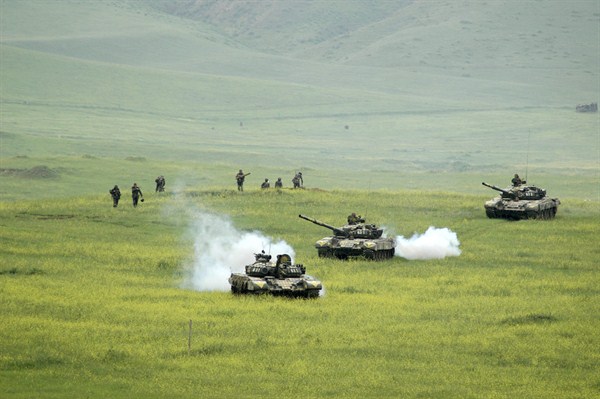This year, while Europe commemorated 100 years since the beginning of World War I, a long-forgotten conflict on the edge of the continent rumbled on. Armenia and Azerbaijan have been locked in a contest for control over Nagorno-Karabakh for more than 25 years. Beginning as an obscure conflict in a remote Soviet province during perestroika, the Nagorno-Karabakh stand-off has evolved into an enduring rivalry between two independent states, profoundly affecting both and casting a consistent shadow of insecurity across the South Caucasus.
The conflict began in 1988, when a movement formed by the local Armenian majority in Nagorno-Karabakh, then an autonomous province within the Soviet Republic of Azerbaijan, called for unification with Armenia. Armenians see the conflict as a self-determination struggle by the Armenians of Nagorno-Karabakh against their unjust incorporation into Soviet Azerbaijan in the early 1920s, and against heavy-handed Azerbaijani rule ever since. Azerbaijanis portray the conflict as a campaign of territorial conquest waged by Armenia. Rejecting any Azerbaijani component to Soviet misrule, they point to Karabakh's historical inclusion within an Azerbaijani Muslim space long before the Soviet takeover in 1921. The conflict progressed from intercommunal violence in 1988-1990 to a war between the newly independent Armenian and Azerbaijani republics after the Soviet Union disintegrated in 1991. The conflict was transformed by the outcome of the war, in which Armenian forces took control not only of virtually the entire territory of Nagorno-Karabakh, but also of most of the seven adjacent regions, resulting in massive waves of Azerbaijani internal displacement.
Twenty years after the cease-fire and 11 years into the presidency of Ilham Aliyev, Azerbaijan's transformation from the shattered and defeated country of 1994 into a confident and influential petro-state is complete. The oil boom may have peaked already, but still-considerable revenues and growing gas production mean that Azerbaijan’s star looks set to keep rising. This is reflected in a widely publicized military spending program aimed at solidifying the perception that the military balance is shifting in Azerbaijan’s favor.

